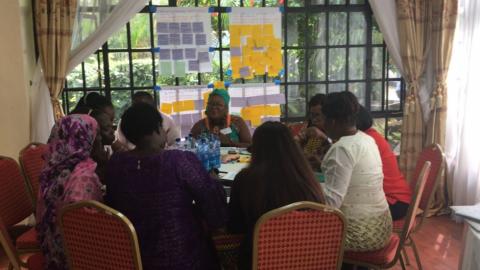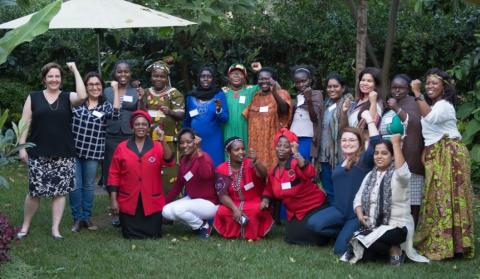
The power of women leaders in the struggles for land, housing and natural resources
From 14-16 May 2018 eighteen grassroots women leaders from ten countries in Africa, Asia and Latin America gathered together for a strategic exchange around women’s leadership in struggles to advance land, housing and natural resource rights. The exchange, which took place in Nairobi, Kenya, sought to support mutual learning, experience sharing and solidarity between grassroots women leaders and strengthen their visibility as essential in building effective and inclusive human rights struggles. The meeting followed a workshop on human rights principles and organizing for Endorois indigenous women leaders at Lake Bogoria, Kenya, earlier that month.
Members who participated in the exchange include: Abahlali baseMjondolo, Ogiek Peoples' Development Program, Organización Fraternal Negra Hondureña (OFRANEH), Asia Indigenous Peoples Pact, Endorois Welfare Council, Consejo de Pueblos Wuxhtaj, World Forum of Fisher Peoples (WFFP), National Fisheries Solidarity Organization (NAFSO), Posco Pratirodh Sangram Samiti, and Movimiento Unificado Francisco Sánchez-1932 (MUFRAS-32) as well as the Mano Basin Women's Natural Resources Platform, which has applied for membership in the network This meeting was developed by the Social Movement Working Group and the Women and ESCR Working Group, and a session was facilitated by Just Associates (JASS).
Human rights related to land, housing and natural resources have long been central to collective work coordinated within ESCR-Net, and approximately one half of our members work on these issues. Strengthening the leadership of social movements and grassroots groups, especially grassroots women, in struggles for land, housing and natural resources has been a strategic priority which was reinforced during a strategy meeting on land, housing and natural resources that took place in New York, 10-11 March 2018. That meeting foregrounded the different and disproportionate impacts on women of violations of land, housing and natural resource rights and women’s vital leadership in resistance struggles.
Connections between struggles regarding to women leaders’ experiences
By sharing powerful testimonials about their social movement struggles and recalling their experiences as leaders, participants identified connections between their own experiences and those of fellow leaders. Discussion centered on the need to increase women’s participation in decision-making processes, implement internationally recognized human rights standards and overcome structural and legal obstacles to women’s ownership of, and access to, land. “We are a significant proportion at the grassroots, but not at the decision-making level,” said one participant, underscoring the power of solidarity amongst women in the face of these challenges.
Participants also discussed the ways in which gender stereotypes tend to render their contributions to the struggle invisible or less valued, compared than the contributions of their male counterparts. Among the ways that stereotypes undermine women’s leadership, participants discussed how women’s sexual history, educational levels or marital status are used to discredit women and foster competition amongst female leaders. A recognition of the physical and verbal attacks or threats leveled against women leaders pointed to the importance of protection and security measures for women human rights defenders. “We are fighting against powerful actors,” one participant asserted, during a session on security and self-care for women activists facilitated by Just Associates. That session focused on the ways in which discrimination heightens women’s vulnerability to reprisals when they assume leadership in their struggles, and the critical importance of self-care in that context.
The discussion also highlighted the strategic importance of having allies amongst men, recognizing that gender equality concerns men as well as women. The critical role of the youth in ensuring intergenerational dialogue and continuity within social movement struggles was also addressed. Participants reinforced the importance of awareness-raising, training and other measures to foster the participation, visibility and leadership of youth and, particularly, young women within social movements.
Proposals for ongoing collective work
The final session of the workshop was dedicated to ideas about the future of collective work amongst ESCR-Net members to support women’s leadership in social movement struggles around land, housing and natural resources. Key among the ideas articulated were facilitating ongoing exchange around best practices and strategies via social media and strengthening the networks and alliances at the country level.
Participants also suggested collective work to promote capacity building for grassroots women and youth on political education and the application of human rights principles in practice. Similar exchanges of grassroots women leaders in the future were also proposed, as were collective efforts to document human rights violations against women that are connected to land, housing and natural resource issues. Other measures recommended included actions to make visible women’s contributions to the social movements in which they participate. “Our voices need to be heard and our strength needs to be visible,” one participant emphasized. Documenting women’ stories about their path to leadership and building common messages across struggles to create more awareness about the importance of women’s leadership in grassroots social justice efforts were also suggested. To that end, participants were interviewed during the workshop about the importance of women’s power to the struggle for land, housing and natural resources and a video including these interviews will soon be available.
A strategy plan to advance women’s rights to land, housing and natural resources is now under development, integrating the input received from women leaders during this exchange, the above-mentioned strategy meeting, the Training of Trainers with the Endorois women that also took place on May 2018, and further consideration about openings to advance human rights and social justice in the coming years.

